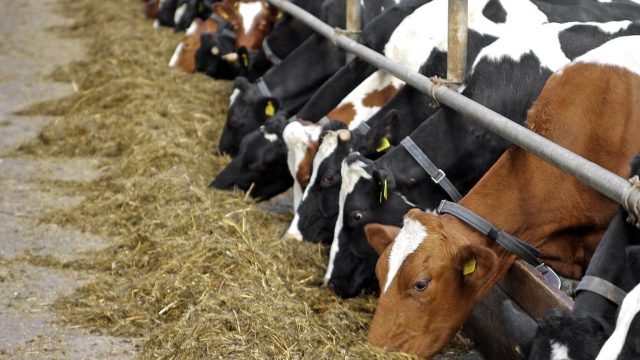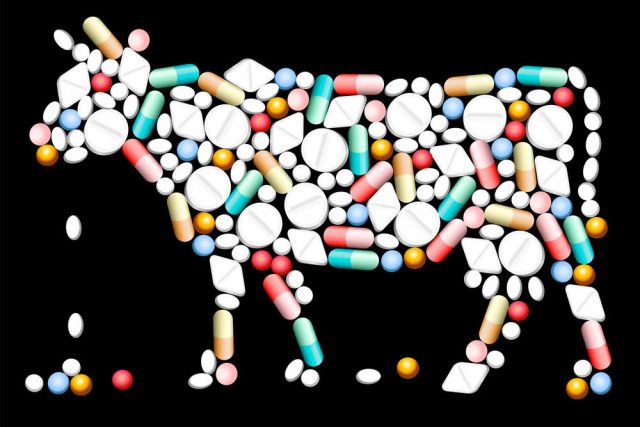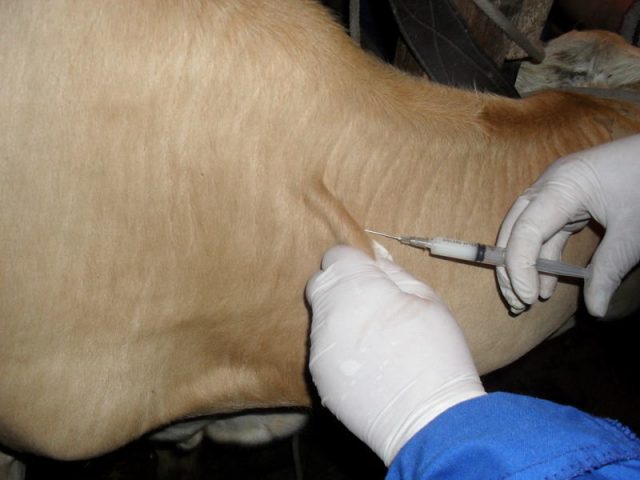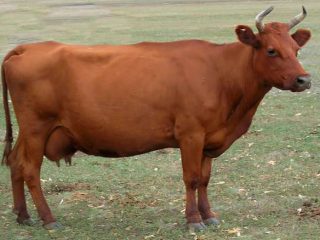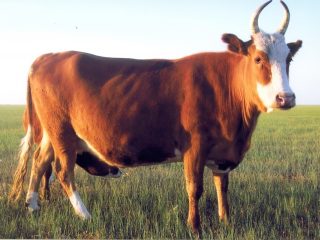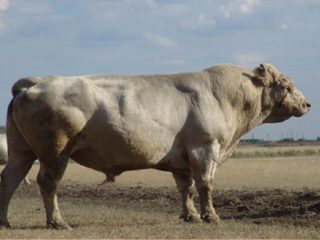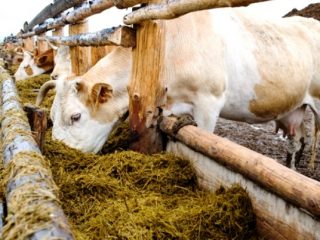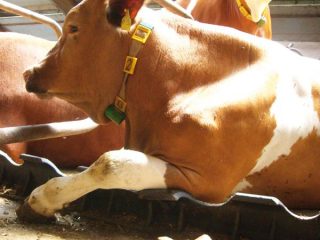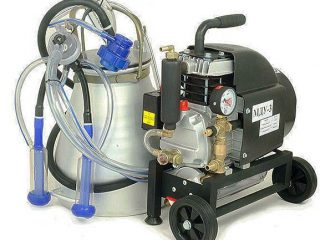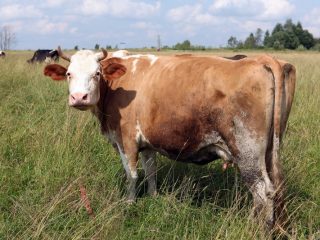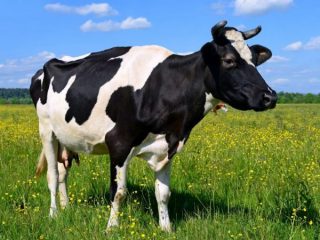Content
Cattle's internal reserves are not endless, so the farmer needs to control vitamins for cows after calving and before giving birth. Substances affect the health of the female and offspring. A diet compiled according to the rules will saturate the animals with important components and save them from problems in the future.
Features of feeding a cow before and after calving
Pregnancy and childbirth are a difficult period during which the animal’s body expends a huge amount of energy. In order to get healthy offspring and not harm the female, you need to correctly create a menu. To maintain the biological activity of cattle, they need nutrients. Chemical processes in the body occur with vitamins and minerals.
Not all components are needed by the cow before and after calving. Some useful elements are released by the digestive system. During the dry period, the animal does not have enough food reserves. Problems often arise in winter and spring due to a lack of sunlight and fresh grass. To ensure that the cow receives the necessary vitamins, the amount of proteins, fats and minerals in the diet is increased.
2 weeks before calving, legume-cereal hay is introduced into the cow’s menu and the amount of concentrates is reduced. To prevent excess fluid from accumulating in the body, succulent food is not given.Excess moisture during childbirth leads to dangerous complications, swelling in the udder. The rational menu contains (in percentage):
- silage – 60;
- roughage – 16;
- concentrated varieties – 24.
A pregnant cow is fed 3 times a day at the same time. They use high-quality hay, bran and corn dirt. Rotten and rotten foods are dangerous to health. The food is sprinkled with crushed chalk and salt. Give warm fresh water before each meal.
While the embryo is developing, it is necessary to provide the female with nutritious food. Before childbirth, the body accumulates vitamins, fats and proteins. Before calving, the individual should be well-fed, but not obese. Control the intake of sugar and starch, otherwise there is a risk of getting diseases of the digestive system. On average, weight increases by 50-70 kg.
After calving, it is important not to overfeed the cow, because... Disturbances in the functioning of the gastrointestinal tract may occur. During this period, the body takes vitamins and minerals from reserves that accumulated during the dry period. It is forbidden to starve an animal.
What vitamins are needed for cows before calving?
Before giving birth, cows often lose their appetite. The body draws the missing components from the reserve without consequences for the baby. If the female has managed to accumulate nutrients in advance, then a short refusal of food will not have a negative effect on the fetus.
A lack of provitamin A adversely affects the health of the female and the viability of the calf, complications during childbirth and the birth of blind offspring are possible. Under natural conditions, carotene comes from succulent food, which is prohibited during dry periods. The daily norm is from 30 to 45 IU; for prevention, 100 ml of fish oil is given for a week.
Lack of vitamins in cows before calving affects the health of the mother and offspring. E-vitaminosis gradually develops into pathologies of the uterine mucosa. In the early stages it leads to the resorption of the embryo, and in the later stages it leads to miscarriage or the birth of a sick calf. The norm for an adult is 350 mg per day. In case of deficiency, veterinarians prescribe intramuscular injections of Selemaga.
Vitamin D is an important component that helps absorb the macronutrient calcium. The lack of this vitamin before calving negatively affects the strength of the cow’s bones and the formation of the fetal skeleton. When exposed to sunlight, the substance appears on the skin of animals. The daily dose is 5.5 IU or 30 minutes under ultraviolet light.
Vitamin B12 in cows before calving is responsible for the formation of blood cells, and if there is a deficiency, it threatens the appearance of sick or dead calves. To replenish reserves, professional feed and premixes, high-quality bran and yeast are used. Injections with the drug are indicated after prolonged digestive problems. For 1 kg of weight take 5 mg of cyanocobalamin concentrate.
The complex product “Eleovit” contains 12 microelements. The medicine is used for the prevention of vitamin deficiencies and in the treatment of complications of vitamin deficiency in pregnant women. The course of injections has a positive effect on the viability of the fetus.
What vitamins are needed for cattle after calving?
After giving birth, the female is given warm water, an hour later the colostrum is milked and fed to the baby. At first the menu consists of soft hay, the next day it is supplemented with 1 kg of liquid bran porridge.After 3 weeks, the cow is transferred to the usual diet (silage, root crops). It is important to monitor the amount of food eaten and not to overfeed the cattle, otherwise obesity and digestive disorders may occur.
For the normal functioning of the body of the female who has given birth, the level of useful elements is maintained. If you do not make up for the losses, then in a couple of weeks the signs of vitamin deficiency in the cow after calving will become noticeable. The standard diet does not fully provide cattle with nutrients, so the menu needs to be changed.
Plant food contains a lot of provitamin A. The deficiency is typical for young females and individuals with extensive lactation. When there is a deficiency, animals' eyes become inflamed and coordination of movements is impaired. The problem will be prevented by the prophylactic use of fish oil or a course of injections. The dose for a cow after calving is from 35 to 45 IU.
The daily requirement of vitamin D is 5-7 IU. After childbirth, adults often lose teeth and experience increased nervousness and excitability. The lack of nutrients in milk negatively affects the health of the calf (deformation of limbs, developmental delay). The natural source of the element is sunlight. To prevent deficiency, you need to walk the cow daily. In cloudy weather in winter and in spring, irradiate with an ultraviolet lamp.
Vitamin B12 is not found in plant foods. Vitamin deficiency in a cow after calving manifests itself in the form of metabolic disorders in the liver and carbohydrate starvation of cells. The animal does not eat well and dermatitis occurs.
Vitamin E deficiency negatively affects the health of young animals. Calves gain weight poorly, growth and development are impaired. Long-term deficiency leads to muscular dystrophy and paralysis.If cows are not given the required component after calving, then destructive changes occur in the functioning of the cardiovascular system. The daily dose for an adult is 5.5 IU.
After calving, cows have different needs for vitamins. Animals with a high lactation rate are fed 5 times a day; females of average productivity need three meals a day. The basis of the menu is hay, which is chopped and steamed before use. For 100 kg of live weight, take 3 kg of product.
An optimized diet will eliminate emergency fortification. To improve milk yield after calving, it is necessary to use succulent types of food when feeding. Cake and bran are natural sources of nutrients; switching to greens improves food absorption.
Preparations based on 4 components (A, D, E and F) are often used. For treatment, concentrated “Tetravit” is chosen, and “Tetramag” is suitable for prevention. To choose the optimal rate, you need to consult a veterinarian. A large dose is toxic to animals, and a small dose will not give the desired effect.
What else to add to your diet
For full development, you need not only vitamins, but also substances responsible for the formation of muscles, bones and the immune system. Protein is involved in cell synthesis and forms all organs. Lack of protein in cows after calving manifests itself in the form of deterioration of lactation, increased feed consumption or perversion of appetite. Calves often get sick and do not gain weight well.
Microelements are needed to maintain the vital functions of cows before and after calving. Females lose substances along with milk. Deficiency manifests itself as:
- decreased productivity;
- activation of diseases;
- delay of biochemical processes.
With a lack of copper in cattle, anemia and exhaustion are noted. Adults constantly lick the fur, and calves develop poorly. The microflora of the digestive organs is disrupted, which leads to frequent diarrhea. Weakened animals move little and lose vitamins and calcium from their bones. Copper is contained in hay and grass that grow on red soil and black soil. Feed yeast, meal and bran will help prevent danger.
Iodine is responsible for the functioning of the endocrine system. A lack of microelement provokes fetal death or the birth of a stillborn baby. After calving, cows' milk yield deteriorates, and the fat concentration in milk decreases. Iodine enters the body with greens and hay, enriched with salt and potassium.
Manganese deficiency can cause abortion or calf death. Young animals are born weakened, with congenital pathologies of organs. In females, lactation worsens and the fat content of milk decreases. Special supplements will help fill the deficiency. The substance contains large quantities of feed flour (from meadow grasses, pine needles), wheat bran and fresh herbs. For preventive purposes, carbon dioxide and manganese sulfate are introduced into the menu before and after calving.
Table salt is given to cows before and after calving to provide the body with macroelements sodium and chlorine. The component is not found in plants in the required concentration, so it is added with food. Without it, the functioning of the digestive and nervous systems is disrupted, and lactation worsens. The substance improves food absorption and has an antibacterial effect.
To ensure that the macroelements phosphorus and calcium (8-10 mg) enter the animal’s body during pregnancy, professional premixes are used.
The mineral iron is involved in the synthesis of blood and internal organs.If there is a deficiency, cows develop liver dystrophy, anemia and goiter. 5 weeks before calving, the cow is given intramuscular injections of the drug "Sedimin". Recommended dose – 10 ml.
Conclusion
Vitamins for cows after calving and before giving birth are necessary to get healthy offspring. During pregnancy, the female accumulates nutrients, which she then actively uses. A deficiency of one element can result in the birth of a stillborn or nonviable calf. A well-formulated diet contains all the important components. Injections of veterinary drugs will help quickly eliminate vitamin deficiency.
